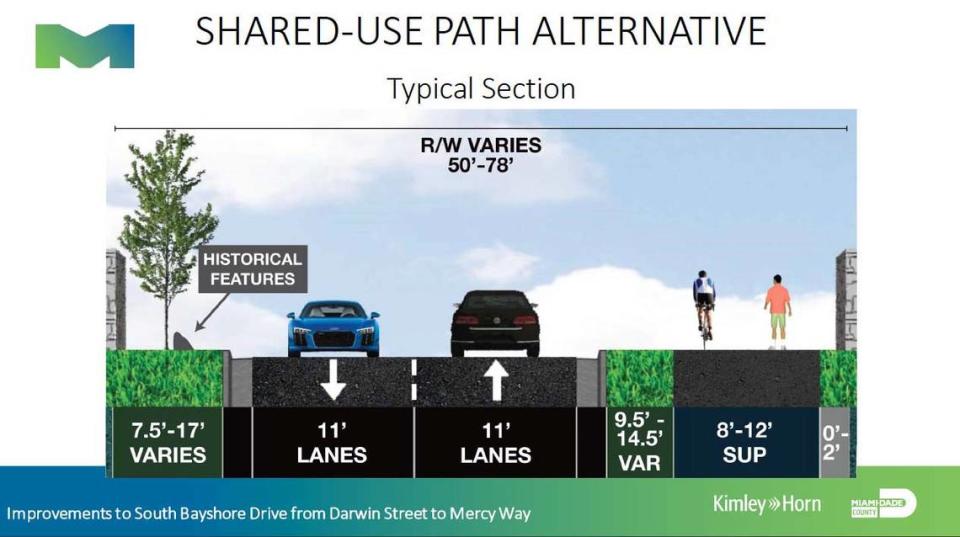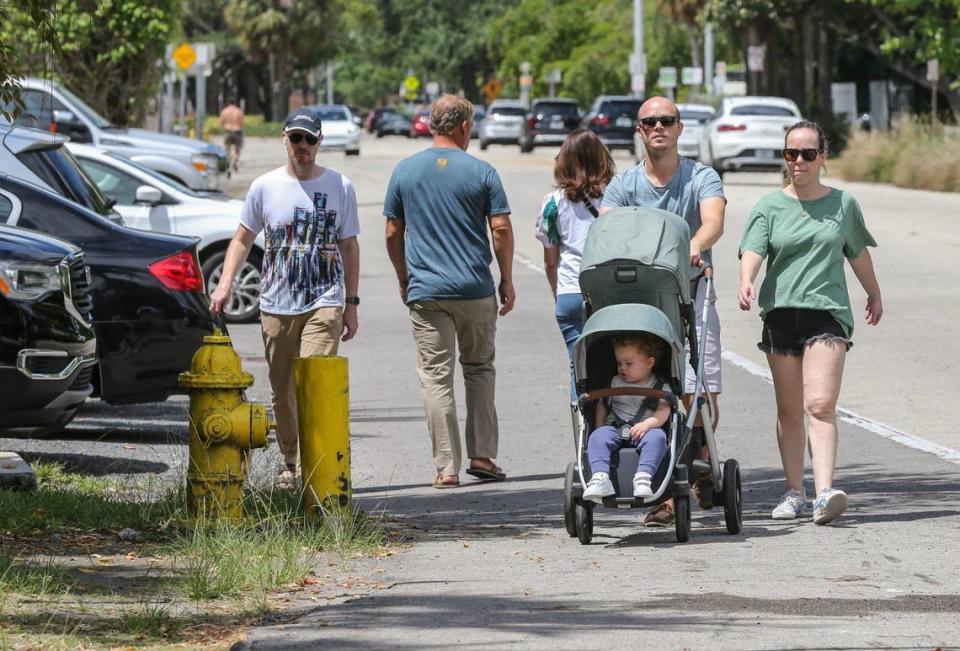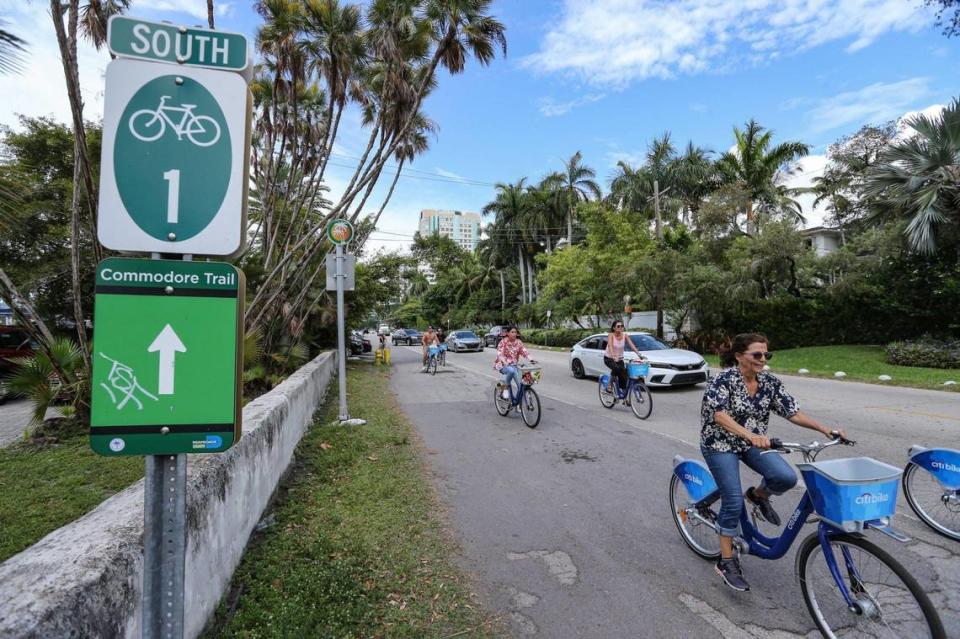‘It puts everyone at risk.’ Critics assail plan to rebuild Bayshore Drive, Commodore Trail
A long-delayed Miami-Dade County plan for the total reconstruction of Coconut Grove’s South Bayshore Drive, one of Miami’s most scenic and historic roads, has run smack into withering opposition from many of the people it was meant to serve -- the pedestrians, runners and cyclists who have turned the busy artery and a disheveled trail that runs along it into one of the city’s premier recreational areas.
More than two years in the works, the still-unfinished plan for the $16 million project entails significant functional improvements to the overburdened, flood-prone road, including a big new pump and treatment station in Kennedy Park to suck increasing amounts of stormwater off Bayshore and pump it into adjacent Biscayne Bay.
Another key element, and the focus of public disapproval, is a proposed redesign of the heavily used 1.5-mile piece of the scenic, tree-lined but hodge-podge Commodore Trail that runs along the east edge of Bayshore Drive, following the route of an historic early Miami dirt path. The county project runs roughly from Monty’s in the Grove north to the southern entrance to Mercy Hospital.
Named after Grove settler Ralph Munroe, a yacht designer, the Commodore path consists of strung-together sections of sidewalk and faintly marked roadway shoulder that are full of cracks, bumps, potholes and other obstacles and in places provide little elbow room for the crowds of people on foot, on bikes and scooters that share it. Collisions and near-collisions among people on foot, on bikes and in cars are common, users say.

But a nearly complete new design for the road and trail that county engineers and their consultants presented at a well-attended meeting in the Grove on Monday evening drew boos, catcalls and unanimously poor reviews from the audience in the room and on Zoom.
The issue: The county’s proposed redesign calls for a new paved trail that, like the existing one, would be shared by people on foot and people on bikes or scooters going in both directions, with no separation among them, all along a constricted pathway that in places would be as narrow as eight feet.
At the same time, the county has consistently declined to provide designated lanes on the roadway for the high numbers of faster cyclists who use Bayshore as a connection between points to the south and the Rickenbacker Causeway to Key Biscayne, another popular recreational destination in a car-choked city lacking them.
That, critics say, not only does little to improve safety for users along the corridor, but represents a formula for conflict and collisions on both the trail and road that could be easily prevented with some separation.
“It’s a wonderful project with unintended consequences, and those consequences are my life,” Randall White, a Grove resident and board member of the Everglades Bicycle Club, the county’s largest, told a panel of county engineers and consultants at the meeting at the Carrollton School of the Sacred Heart. “This project is doing everything but looking out for human beings.”
A common refrain among critics at the meeting was “you’re not listening,” reflecting the frustration of trail and road users who have been asking the county public works department for more than two years to change its design to provide separation for different users -- something they say the corridor has ample space for.

Instead, some critics say, improvements for people in cars have taken priority in the county plan, including the addition and lengthening of left-turn lanes designed to improve the flow of motorized traffic. They say the county should be instead looking to slow often-speeding traffic on Bayshore, including by narrowing car lanes from 11 feet to 10 feet.
Eliminating or shortening left turn lanes and narrowing lanes and the width of curbs and gutters proposed for stretches that don’t have them now would provide plenty of room for everyone along most of the corridor, they contend.
“The path you’ve taken is like the worst of all possible actions,” Paul Schwiep, a Grove lawyer who has served on the county’s Citizens Independent Transit Trust, told the panel. “It puts everyone at risk.”
The trail and roadway design the county presented on Monday reflected few changes since the last time it held a public meeting on the plan in June of 2022, when the design was at 60 percent of completion. This newer version is at 90 percent of completion, reflecting mostly technical refinements.
The county engineers also rejected an alternative plan developed by a consultant for Friends of the Commodore Trail, a group of advocates who have long pushed for pathway improvements. Their plan envisions two separated, side-by-side paved trails -- one for people on foot and the other for people on wheels -- with marked lanes in each for those going in opposite directions.
Without that, several speakers said, faster cyclists will have no choice but to keep using the road to avoid hitting pedestrians and slower users on the trail. Some noted that the partly completed Underline trail running under the elevated Metrorail line nearby provides wide, separated paths for pedestrians and cyclists for most of its length to ensure safety.
The engineers say the design has been significantly constrained by the need to preserve as many of the trees that define the corridor as possible, and a requirement by the city of Miami that historic features, consisting in the main of rock walls along its eastern edge, be protected.
In many places, that means the off-road path has to meander around trees and other obstacles and is squeezed tightly. Plans that provide separation “impact” more than 130 of the 364 existing trees along the route, they said -- although they could not immediately provide details or tree-survey maps when asked by members of the audience.
Lanes, meanwhile, must remain 11 feet wide to accommodate transit buses, they said — an assertion some advocates dispute. The overall roadway width cannot change because it’s a designated historic corridor, the engineering team said.
“We don’t have the space without hurting the cultural assets and the trees,” Miami-Dade Commission Raquel Regalado, who represents the Grove and is running for re-election in November, told the audience.
But former Pinecrest Mayor Cindy Lerner, who is running against Regalado, said at the meeting that the county plan reflects “no concern for safety” for people on foot or bikes
Audience frustration only grew as county communications officials strictly enforced a two-minute limit on comments from the public, shutting off the mic for anyone who strayed even a few seconds over. The meeting, scheduled for a 6:30 p.m. start, was cut off at 8 p.m., prompting angry shouts from the audience as many who wanted to speak were unable to do so.
About 15 people spoke in person or on Zoom, but officials had said that 35 had signed up to speak at the start of the meeting. Not one person who spoke favored the county plan.

Regalado said, without elaborating, that federal regulations required the meeting to end at its scheduled 8 p.m. conclusion, and promised a followup meeting, though only on Zoom.
She urged attendees to accept the county plan as the best available compromise. She noted the Bayshore reconstruction has been delayed for 15 years over conflicts over its design that scuttled a previous city of Miami effort. The county took over the project when the city failed to even start on it.
“I would like to get this project off the books and in the streets,” Regalado said. “No project is perfect, but I would really like to get it done.”
Project plans call for start of construction in Fall of 2027, with completion two years later. The project is fully funded.
A second Commodore Trail redesign project, this one being run by the city and a consultant with expertise in bike and pedestrian planning, is also underway. That project covers two other segments of the trail, from Mercy Hospital to the Rickenbacker Causeway on the north end, and from Bayshore Drive along Main Highway to the path’s southern endpoint at Cocoplum Circle on the border with Coral Gables.

